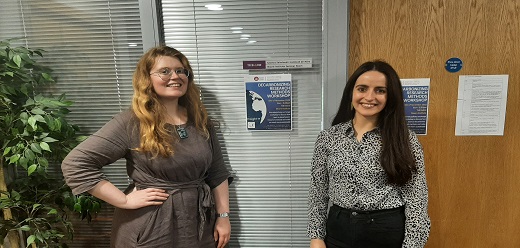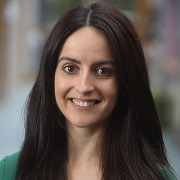
Widening the purview of research to include research environments
Irish universities are striving to reach net-zero carbon emissions.[1] As a core part of university operations, researchers can be leaders in the decarbonization agenda. Environmentally-focused research is on the rise across all disciplines, and it is being brought into the classrooms. Yet, is researching and teaching about human-environmental relations enough? What about our own carbon impact as researchers? What if our research causes us to travel a lot, or use energy-intensive equipment, or store large amounts of data? Does this counteract the environmental benefit of our knowledge and teaching? The climate crisis prompts such questions. We are running out of time to avoid crossing a threshold of 1.5˚C global warming after which point the planet becomes unlivable for future generations. As such, research itself needs to be decarbonized. Researchers must align with the students and environmentalists who are pushing for transformations in the way we all work and live. Whether or not we research or teach on the environment, we all need to be conscious of travel, consumption, waste, and storage.
On the 18th and 25th of November 2022, my PhD colleague Laoighseach Ní Choistealbha and I ran workshops in the University of Galway to address these questions. The workshops were entitled “Decarbonizing Research Methods”, and they were sponsored by the Moore Institute for Research in the Humanities and Social Sciences, the Insight SFI Centre for Data Analytics, and the Irish Humanities Alliance. The workshops were hybrid to allow for Iocal, national, and international participation (and we did get international input from Canada, Germany, and North America). The idea was to gather a range of academics and administrative staff from various offices and disciplines to discuss the contradictions, challenges, and possibilities of decarbonizing research itself. We figured that many academics already want to decarbonize their work. Yet, we reckon that it is difficult for individual researchers to make the necessary changes: they need resources, infrastructure, and a supportive culture. Thus, decarbonizing research has to be a collective endeavour and one supported by institutions and society. The events were centred around sharing ideas, concerns, and concepts; yet they were also centred around bringing people together to emphasize the interdisciplinary and collective nature of the topic.
Laoighseach and I came to the topic from our own research backgrounds in the environmental humanities. The environmental humanities addresses ecological problems through questions relating to meaning-making, culture, values, ethics, history, and politics. Yet, humanities approaches to environmental problems often get overlooked in wider governance, political, and policy conversations. [2] The climate crisis is often figured as a technical problem needing technological and economic fixes, rather than equally a problem of values, culture, and ethics. Foregrounding an environmental humanities perspective, Laoighseach and I focused on questions of justice and equity when devising talking points for the event. We were particularly inspired by the work of the Low Carbon Methods research group, who have already been investigating possibilities for decarbonizing research itself and who tend to emphasize equity and environmental justice.[3] After various readings and our own discussions, Laoighseach and I devised the following questions to steer the event:
- How can decarbonizing research be a collective endeavour?
- How do funding streams and hiring or promotion practices hinder experimentations with low-carbon research methods?
- What institutional, structural, and/or research culture changes would be needed in order to decarbonize research methods?
- Are there possibilities for more collaborative forms of research?
We had rich discussions across the two days. These included presentations from two University of Galway-based scientists who have worked toward certification from My Green Labs, a non-profit that provides programmes for laboratories to significantly reduce their environmental impacts. Dr Siobhán Gaughan spoke about how the Molecular Parasitology Laboratory in University of Galway got its certification in Spring 2022 through measures such as decreasing freezer temperatures, switching off equipment when not in use, and sharing surplus equipment with other labs. Tanya O’Brien spoke about how University of Galway’s Biomedical Engineering laboratory is working towards certification by making similar changes, which also include using more energy-efficient computing devices and managing chemical inventory. The passion and commitment of Green Labs-affiliated scientists came across in the two presentations. It was clear that My Green Labs initiatives foster team-building, coordination across different labs, and pride of work, which in itself is helpful for the decarbonization agenda. Many workshop participants were wondering if programmes like My Green Labs have any import for non-laboratory spaces. One participant rightly highlighted that librarians and archivists are typically very interested in reducing travel and waste surrounding their work environments, and would likely welcome some library or archive equivalent of a Green Lab certification.
Engineer Dr Vincent Carragher made the important point that decarbonization needs to be incorporated into research design from the very beginning. He used the example of Cloughjordan ecovillage, whose inhabitants used the principles of decarbonization to direct the design and infrastructure of the village (for example, they cycle more, use fewer bins, and have a district heating system). Dr Carragher’s point was that it is easier to decarbonize research if sustainability is already built into research design. Yet, in order to decarbonize research design, Dr Carragher argued, researchers need to decarbonize their very ideation. Humanities scholars Professor Patrick Lonergan and Dr Nessa Cronin later gave presentations which spoke to such an imperative. Professor Lonergan considered how twentieth-century Irish theatre has unwittingly contributed to global warming through both its material impact (staging, props, tours) as well as its cultural impact in influencing how we think about the environment. Drawing from Andreas Malm’s influential book Fossil Capital, Professor Lonergan considered how theatre and the arts contribute to a naturalization of fossil fuel regimes as normal and inevitable. On the other hand, Professor Lonergan discussed environmentally-oriented plays which have drawn attention to their own constructedness as a way of countering the naturalization of dominant carbon imaginaries. For me, Lonergan’s talk highlighted how a focus on the arts and humanities can address psychological, cultural, or emotional blocks to decarbonization, as well as prompt self-awareness about our way of thinking about the environment.
Dr Nessa Cronin made a more explicit argument for including a humanities approach to decarbonizing research. Dr Cronin aptly observed that culture and the arts can make sustainability “stick” (her phrase): she discussed visual art pieces that intervene in dominant hierarchical ways of imagining human-animal relations and trigger more nonhierarchical counter-imaginaries for the future. Dr Cronin also discussed how the humanities are well placed to scrutinize and critique key concepts such as “sustainability”, “carbon offsetting”, “environment”, and “sustainable development” which underlie decarbonization regimes. This was an idea that came up elsewhere in the workshop, with one participant highlighting that humanities scholars can interrogate whether the 17 UN Sustainable Development Goals that are guiding most university and societal sustainability plans are keeping us on a path of extractive capitalism. Dr Cronin also emphasized that decolonial and feminist approaches to ecological thought are on the rise and are helpful for inculcating the kind of ethically-oriented, self-aware, transformational, and collaborative forms of thinking and action that are needed to decarbonize not just our work, but our societies. If decarbonization must be incorporated into research design from the early ideation phases, then Professor Lonergan’s and Dr Cronin’s talks highlighted that we should look to the environmental humanities.
University structures, norms, and resources were at the heart of the workshop conversations. John McCann, an environmental manager in Buildings and Estates in Queen’s University Belfast, shared some of the laudable measures that Queen’s are taking to decarbonize their campus. Yet, McCann also helpfully pointed out that “business as usual” and net-zero emissions are in tension with each other. Neoliberal universities focus on on gaining global market competitiveness by flying academics around the world and attracting international students, which fundamentally contradicts sustainability measures on campus. McCann emphasized that (i) buildings offices, (ii) research and enterprise, (iii) teaching, and (iv) community and social contexts all need to cohere for real change to occur. Later, geographer Dr Patrick Bresnihan raised the issue of how travel is built into a lot of undergraduate and postgraduate programmes, even programmes geared towards collecting data on environmental damage and climate change. Dr Bresnihan wasn’t advocating for a total reduction of travel, but rather open and honest conversations around how to plan for student or researcher travel in environmentally just and equitable ways. Dr Bresnihan suggested that senior academics should take the lead on raising concerns and ideas around this topic, especially when such conversations become antagonistic and thus risky for precarious or early career researchers. Dr Bresnihan also raised a salient point that had been raised by others, which is that early career researchers should have scope to travel a bit more than more senior researchers who may not be under as much pressure to network and establish themselves.
The idea of decarbonizing the way we work solicits interest from all disciplines. Participants spoke with real passion. They got into the spirit of throwing out ideas. One outcome of the workshops was that they widened the space for incorporating “research environment” into considerations of environmental research. Work and research spaces are environments too. Laoighseach and I hope that some of the ideas and discussions from the sessions will influence more environmentally-conscious academic events, research plans, education programmes, and funding applications. Yet, we also hope that the small changes that individuals or groups of researchers can make are tied to calls for institutional, societal, and political transformations. We need to do more than work with each other across disciplines: we need to also use our voice with our institutions, policymakers, and societies.
[1] See university strategies such as the (i) University of Galway Sustainability Strategy 2021-2025: https://www.universityofgalway.ie/media/sustainability/files/NUI-Galway-Sustainability-Strategy-2021-2025.pdf, (ii) Queen's University Belfast Strategy 2030: https://www.qub.ac.uk/home/Filestore/Filetoupload,1118456,en.pdf, and (iii) University College Dublin Strategy 2020-24: https://strategy.ucd.ie/wp-content/uploads/2019/12/UCD_2024_Strategy_Document.pdf.
[2] See Nessa Cronin, “Climate Change: Perspectives from the Arts and Humanities”, Irish Humanities Alliance Blog, 7 Jan 2022, https://www.irishhumanities.com/blog/arts-and-humanities-perspectives-on-climate-change/.
[3] See Elliot, Kate et al. “The Ways We Work: Oily Entanglements.” Network in Canadian History and Environment, 6 Apr 2022, https://niche-canada.org/2022/04/06/the-ways-we-work-oily-entanglements/.


